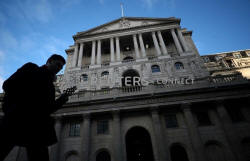UK pay growth hits 4% for first time since 2008 but hiring slows
 Send a link to a friend
Send a link to a friend
 [September 10, 2019] By
William Schomberg and David Milliken [September 10, 2019] By
William Schomberg and David Milliken
LONDON (Reuters) - Britain's workers
received their biggest pay rises in more than 11 years this summer as
the unemployment rate fell back to its lowest since the mid-1970s, even
as the country's political crisis over Brexit deepened.
But there were a couple of signs in Tuesday's official data that the
approach of the latest deadline for leaving the European Union was
making some employers nervous.
Hiring was weaker than expected by most economists and vacancies fell to
their lowest level since late 2017.
"At a testing time, the labor market is surpassing expectations, though
there are early signs the jobs boom could be cooling down," said Tej
Parikh, chief economist at the Institute of Directors, an employers
group.
The Office for National Statistics said total earnings growth, including
bonuses, rose by an annual 4.0% in the three months to July, up from
3.8% in the three months to June for its strongest increase since
mid-2008.
Pay growth is watched closely by the Bank of England to gauge future
inflation pressures, and the latest increase was stronger than all
forecasts in a Reuters poll of economists.

"Once adjusted for inflation, they have now gone above 2% for the first
time in nearly four years," ONS statistician David Freeman said.
Excluding bonuses, which smooth out some volatility, pay growth slipped
back to 3.8%, in line with a Reuters poll forecast.
The unemployment rate fell to 3.8%, back to its joint lowest since the
three months to January 1975.
JOB CREATION DOWN
But job creation was lower than anticipated at 31,000, weaker than the
median forecast of 53,000 in the Reuters poll.
Vacancies fell too, touching their lowest level since the three months
to November 2017 at 812,000, with small companies especially cautious
about seeking new staff.
[to top of second column] |

A man walks past the Bank of England in the City of London, Britain,
February 7, 2019. REUTERS/Hannah McKay

Britain's economy, which has been flirting with recession ahead of Brexit, has
been heavily reliant on spending by consumers that has been boosted by the
country's jobs boom and rising pay.
Many economists have attributed the strength of the labor market, at least in
part, to employers hiring workers that they can later lay off rather than making
longer-term commitments to investment.
There have been other signs that employers are turning more cautious about
hiring before the Brexit deadline of Oct. 31, with Prime Minister Boris Johnson
saying he will take Britain out of the EU without a transition deal if
necessary.
A survey published last week showed the number of workers hired for permanent
jobs via recruitment agencies fell at the fastest pace in more than three years
in August. [nL5N25W25B]
Despite the rise in pay, the BOE is widely expected to wait for the outcome of
Brexit - which it fears could damage Britain's economy if there is no deal with
Brussels to ease the transition - before any decision to resume its gradual and
limited series of interest rates hikes.
Ruth Gregory, an economist with consultancy Capital Economics, said the big
picture of low unemployment and rising pay was likely to mean the BoE would
stick to that plan when it announces its latest policy decision on Sept. 19.
"The labor market still looks set to provide solid support to the economy over
the next few years and could prevent the Bank of England from becoming too
dovish against the weakening global backdrop when it meets again next week," she
said.
(Writing by William Schomberg; Editring by Mark Heinrich)
[© 2019 Thomson Reuters. All rights
reserved.] Copyright 2019 Reuters. All rights reserved. This material may not be published,
broadcast, rewritten or redistributed.
Thompson Reuters is solely responsible for this content.
 |